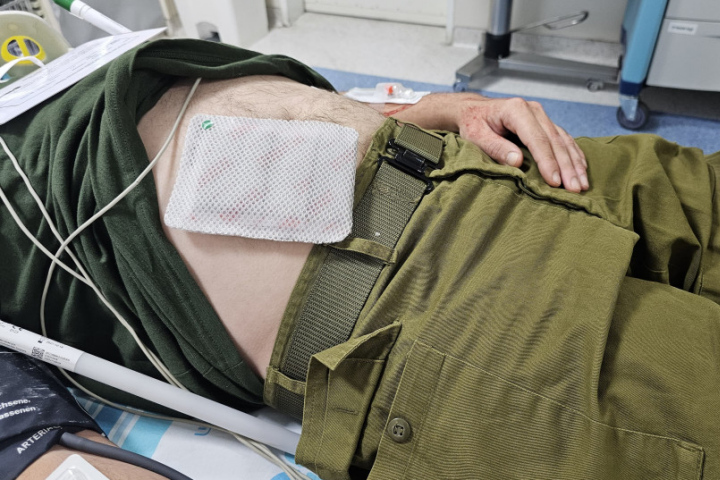Treating complex trauma injuries on the battlefield is challenging. Two critical challenges are blood loss and hypothermia. An innovative solution is now in use on the Gaza front thanks to an Israeli startup and a physician-scientist from Rambam Health Care Campus (Rambam), in Haifa, Israel.
 The smart Rescue Patch being used by the IDF in the field. Photography: Rambam HCC
The smart Rescue Patch being used by the IDF in the field. Photography: Rambam HCC
Israeli startup Noyad-Biomed (Noyad), a biomedical engineering company, is located at Kibbutz Lavi in Northern Israel. The company’s CEO, Hagay Weisbrod, is also a reserve paratrooper battalion commander in the IDF. The company’s medical advisor, Dr. Amit Lehavi, is Rambam’s director of the Pediatric Anesthesiology Unit and a military physician. They joined forces to develop a “smart” heat patch that addresses hypothermia – a condition that occurs when the body temperature rapidly drops below 35°C (95°F). The logistics surrounding the transfer of wounded soldiers from the battlefield to a trauma center like Rambam can become life threating. Hence, preventing and treating hypothermia in the heat of battle saves lives.
As a military soldier, Dr. Lehavi has participated in multiple rescue missions, many of which were in disaster areas. He comments, “When faced with traumatic injuries such as those experienced on the battlefield, the body may go into shock and lose heat for a number of reasons including blood loss, the inability to maintain body heat due to constricted peripheral blood vessels, and sometimes just from lying on the cold ground.”
In his role as Noyad’s medical advisor, Dr. Lahavi studied and tested existing heating technologies. The lab compared five active heating technologies and five passive methods for preventing hypothermia. The research revealed that the Rescue Patch is more efficient than the tested devices that retain their temperature for only 90 minutes or less.
Noyad’s innovative hypothermia treatment is Rescue Heat™, a smart heat patch designed to quickly and safely rewarm and maintain the patient’s body temperature within a normal range. Within 15 minutes of its application to the patient’s skin, the patch reaches 42oC (107.6oF) and maintains that temperature for eight hours, without causing buns on the patient’s body – a significant improvement over currently available solutions.
Now, as Swords of Iron War continues, selected elite IDF units are using the Rescue Patch on the battlefield in Gaza. “We are hopeful that the patch will save lives,” Dr. Lehavi concludes.
Based on an article that first appeared on the YNet news website.

